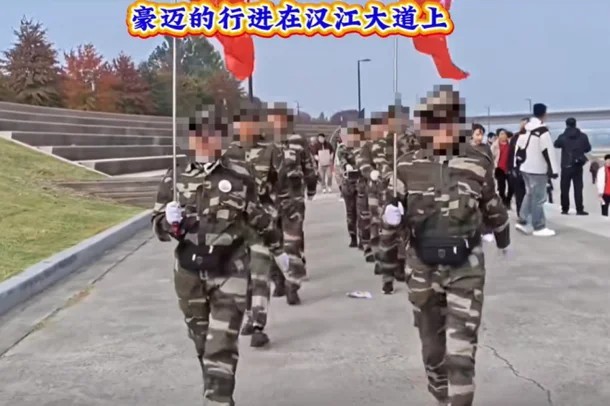Chinese Tourists in Military Uniforms March Through Seoul's Hangang Park: Public Outrage Explodes

Around 100 Chinese tourists staged a military-style march through Seoul's Hangang Park wearing camouflage uniforms and carrying red flags on October 31, triggering widespread condemnation from South Koreans who called the display "crossing the line" in another country's public space.
What Happened at Yeouido
Video footage from the event shows participants dressed in camouflage fatigues marching in formation to music, their synchronized movements resembling military drills at Yeouido Hangang Park's Mulbit Stage area. Event organizers Korea Culture Exchange Business Group claimed only about 20 out of 150 participants wore the controversial military-style uniforms, though the spectacle was jarring enough to spark viral backlash.
The event was organized by Korea Culture Exchange Business Group and the China Health Walking Sports Association as part of an "international walking exchange." Banners at the scene read "2025 Korea (Hangang) International Walking Exchange - Chinese Walking Enthusiasts" in both Korean and Chinese.
About 100 Chinese tourists participated in the event, organized into teams of approximately 10 people each wearing matching uniforms. Some teams wore standard yellow tracksuits, but others dressed in full camouflage tops, bottoms, and caps that looked disturbingly similar to military gear.
Korean Public's Fury
The video, originally posted on Chinese platform Douyin on November 4, rapidly spread across Korean social media with commenters expressing shock and anger.
"Walking clubs are fine, but military uniforms crossed the line," one netizen wrote, while others added "Does this make any sense?" and "Is this Korea or China?"
More pointed criticism followed: "Civilians wearing military uniforms is already problematic, but playing military music and performing drills while pretending to be soldiers seems extremely serious. If the scale gets any larger, it will feel threatening."
The comparison hit hardest: "If Japanese people had done this wearing Self-Defense Forces uniforms at Hangang Park, there would have been an uproar."
That hypothetical scenario perfectly captures why this incident feels so wrong. Imagine German tourists marching through Paris's Champs-Élysées in Wehrmacht-style uniforms, or Russian tourists doing military drills in Warsaw's parks. The audacity would be universally condemned.
Weak Explanations Don't Hold Water
Korea Culture Exchange Business Group released a statement claiming "the controversial clothing is the team uniform of the Zhengzhou walking club 'Eman' from Henan Province, with no military symbolism or political meaning whatsoever."
This explanation misses the entire point. Intent matters less than impact. Citizens noted that "marching with flags in military formation in a park can feel intimidating and may evoke images of Chinese military invasion," pointing out that the choice of location and attire was inappropriate.
The organization promised to "strengthen advance guidance and coordination to prevent misunderstandings arising from cultural expression or clothing differences." But calling this a "misunderstanding" downplays legitimate concerns about foreigners staging quasi-military displays in another nation's capital.
Another Festival, Another Controversy
Just two days later, a similar incident erupted at the Yeoju Ogok Naru Festival. On November 2, the final day of the festival, videos of Chinese People's Liberation Army marching appeared on stage screens while performers in Chinese military uniforms carrying PLA red flags took the stage.
The Yeoju Sejong Culture Tourism Foundation apologized, stating "some content from the Korea-China cultural exchange event organized with Korea Tourism Organization caused concern and discomfort to visitors." Foundation officials admitted "advance review and on-site inspection of event content were not sufficiently conducted."
The foundation acknowledged that among performances by 30 groups from 12 Chinese provinces and cities, "one group's performance featuring China's National Day ceremony with the PLA flag and military parade did not align with the festival's pure cultural exchange purpose."
Two incidents within 48 hours isn't coincidence-it's a pattern.
Where's the Basic Respect?
Korea Culture Exchange Business Group has organized over 463 international exchange events bringing in more than 41,000 people over approximately 10 years from 2011 to 2019, and even received 17 million won in government subsidies from Incheon.
With that much experience, claiming ignorance about cultural sensitivities is unacceptable. These organizers should understand that certain displays-particularly those resembling military activities-require extreme caution in foreign countries, especially nations with complex regional security situations.
The problem isn't Chinese tourists enjoying Korea. The problem is staging performances that look like military exercises in another country's public spaces. No amount of "it's just a walking club" explanations changes how threatening synchronized camouflage-clad groups marching with flags appears to ordinary citizens.
Under current Korean law, the "Act on the Control of Military Uniforms and Equipment" only restricts uniforms similar to South Korean military gear that are difficult to distinguish, while foreign military uniforms or old-style uniforms are not subject to sanctions. Legal technicalities aside, this behavior demonstrates poor judgment and disrespect for the host country.
Tourists Need Better Guidance
When visiting another country, read the room. South Korea lives under constant security pressures from North Korea and navigates complex relationships with regional powers. Large groups in military-style clothing performing coordinated movements isn't "cultural exchange"-it's cultural insensitivity verging on provocation.
Tourism organizations facilitating these events bear responsibility for ensuring appropriate conduct. Getting government subsidies to organize international exchanges comes with obligations to prevent incidents that upset local communities.
Chinese tourists are welcome in Korea. Their economic contribution matters, and genuine cultural exchange benefits everyone. But that welcome requires mutual respect. Save the military cosplay for your own country.



